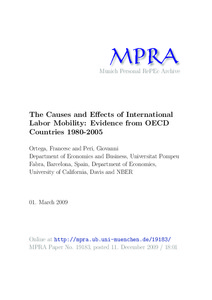The causes and effects of international labor mobility: evidence from OECD countries 1980-2005
"This paper contains three important contributions to the literature on international migrations. First, it compiles a new dataset on migration flows and stocks and on immigration laws for 14 OECD destination countries and 74 sending countries for each year over the period 1980-2005. Second, it...
| Main Authors: | , |
|---|---|
| Institution: | ETUI-European Trade Union Institute |
| Format: | TEXT |
| Language: | English |
| Published: |
Munich
2009
MPRA |
| Subjects: | |
| Online Access: | https://www.labourline.org/KENTIKA-19178116124919963989-The-causes-and-effects-of-inte.htm |
| _version_ | 1771659897569542144 |
|---|---|
| author | Ortega, Francesc Peri, Giovanni |
| author_facet | Ortega, Francesc Peri, Giovanni |
| collection | Library items |
| description | "This paper contains three important contributions to the literature on international migrations. First, it compiles a new dataset on migration flows and stocks and on immigration laws for 14 OECD destination countries and 74 sending countries for each year over the period 1980-2005. Second, it extends the empirical model of migration choice across multiple destinations, developed by Grogger and Hanson (2008), by allowing for unobserved individual heterogeneity between migrants and non-migrants. We use the model to derive a pseudo-gravity empirical specification of the economic and legal determinants of international migration. Our estimates show that bilateral migration flows are increasing in the income per capita gap between origin and destination. We also find that bilateral flows decrease significantly when the destination countries adopt stricter immigration laws. Third, we estimate the impact of immigration flows on employment, investment and productivity in the receiving OECD countries using as instruments the "push" factors only in the gravity equation. We find that immigration increases employment one for one, implying no crowding-out of natives. In addition, investment responds rapidly and vigorously, and total factor productivity is not affected. These results imply that immigration increases the total GDP of the receiving country in the short-run one-for-one, without affecting average wages or labor productivity. We also find that the effects of immigration are less beneficial when the receiving economy is in bad economic times." |
| format | TEXT |
| geographic | OECD countries |
| id | 19178116124919963989_7cdb0b772fd64ff69328f23290cc042e |
| institution | ETUI-European Trade Union Institute |
| is_hierarchy_id | 19178116124919963989_7cdb0b772fd64ff69328f23290cc042e |
| is_hierarchy_title | The causes and effects of international labor mobility: evidence from OECD countries 1980-2005 |
| language | English |
| physical | 46 p. Digital |
| publishDate | 2009 |
| publisher | Munich MPRA |
| spellingShingle | Ortega, Francesc Peri, Giovanni employment investment migration productivity statistics The causes and effects of international labor mobility: evidence from OECD countries 1980-2005 |
| thumbnail | https://www.labourline.org/Image_prev.jpg?Archive=114664693284 |
| title | The causes and effects of international labor mobility: evidence from OECD countries 1980-2005 |
| topic | employment investment migration productivity statistics |
| url | https://www.labourline.org/KENTIKA-19178116124919963989-The-causes-and-effects-of-inte.htm |

